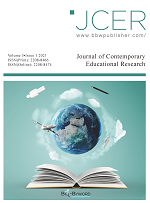Abstract
Cultivating environmental literacy is one of the most important tasks in the face of climate change. The purpose is to construct the general curriculum content of improving climate change adaptation to environmental literacy, and to plan the evaluation mechanism of learning effectiveness. The use of learning theory, Problem-Based Learning (PBL) theory and Plan-Do-Check-Act (PDCA) cycle theory to improve the curriculum content and teaching continued to improve. This study focuses on the design courses from the three cognitive aspects of “conceptual cognition,” “practical exercise” and “hands-on experience.” Teach students how to cope with and respond to climate change to establish environmental literacy to mitigate the impact of natural reactions, and enhance awareness of environmental literacy by learning the science of climate adaptation and mitigation. The results of the actual implementation of the effectiveness assessment shows that, through student’s feedback learning results, the courses presented gains for more, to know the appropriateness and necessity of curriculum planning, can be provided to the basic research of environmental literacy teaching curriculum planning.
References
Tsai HM, 2013, Climate Change and Environmental Ethics, Taipei: The 102nd Teacher Training Camp for Climate Change Adaptation Among Institutions of Higher Education Under the Ministry of Education of the Republic of China.
2009, NOAA. Climate Literacy-The Essential Principles of Climate Sciences. http://www.globalcha nge.gov/
Taylor, Shelley E, et al., 2006, Social Psychology. trans. Man-Ling Jhang. Taipei: Yeh Yeh Book Gallery.
Chen JM, et al., 2006, Social Psychology. Taipei: Yeh Yeh Book Gallery.
Gao SF, 2002, The Fundamental Theory in E-learning The Journal of Design Research, (2).
Shih LF, 1996, Learning Theory: Theories and Principles of Learning Psychology. Taiwan: Liwen Cultural Group.
Barrows S, Tamblyn RNH, 1980, Problem-Based Learning: An Approach to Medical Education. New York: Springer.
Fogarty R, 1997, Problem-Based Learning and Other Curriculum Models for the Multiple Intelligences Classroom. Arlington Heights, Illinois: IRI/SkyLight Training and Publishing, Inc.
Levesque A, 1999, Comparison of Problem-Based Learning and Traditional Lecture Methods on Medical Student Performance. University of Houston.
Zheng YL, 2006, Courses and Teaching of Problem-Based Learning. Journal of Diwan University, (1): 177-95.
Peter S, Stewart M, Graham W, 2001, Problem-Based Learning: Case Studies, Experience and Practice. London: Kogan Page Limited.
Deming WE, 1986, Out of the Crisis. MIT Center for Advanced Engineering Study Cambridge.
Dai JY, 2005, Total Quality Management, Tsang Hai Publishing.
